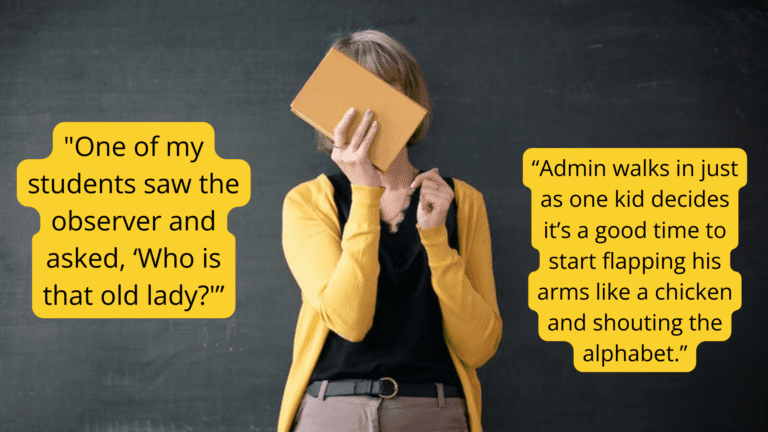For way too long in my first years of teaching, the second an administrator walked in to observe me, I started malfunctioning like a weird, anxious robot.
BEEP BOOP BOP. WHAT IS THE LEARNING TARGET …?
I don’t blame former teacher me for behaving oddly. Observations can be tricky for a variety of reasons, among them:
- The teacher’s nerves knowing they’re being evaluated
- Many evaluation systems not being set up for very standard classroom practices (e.g., when students are taking tests, working independently, etc.)
- Flawed evaluation systems in general
- So many unpredictable factors including student behavior, technology cooperating, fire drills, and emergencies
- Students sensing something is off
- Students’ nerves when being around an administrator
Teachers commented on our observation horror stories article with their own observation mishaps.
Buried in those responses were little pieces of advice that shined like little flecks of gold. Here’s one from Isabel C:
“Anytime it’s my observation, I tell the kids admin is there to observe how they are behaving in my class!”
A similar one from Mark L.:
“I was lucky in that nothing unusual happened during the observations I had with my middle school students. I’d prep the students beforehand by telling them the evaluator—usually the principal—was there to observe you. It worked every time.”
And another from Anjali P:
“It’s so simple. Prep the students ahead of time to believe an administrator is coming to observe student behavior.”
These teachers have it figured out, y’all.
Why this is genius:
- It’s not untrue. The administrator is there to observe students. A huge part of evaluating a teacher means noting how students are behaving, interacting, and connecting with the teacher.
- It allows the teacher to be evaluated on actual teaching instead of factors out of their control (e.g., student behavior).
- It can help lower stress on the teacher’s part knowing there’s a support in place to help minimize outbursts and other less predictable behaviors.
However, like anything in the classroom, you need to be careful about how you implement this strategy.
But proceed with caution:
- Share this as preparatory information, not a threat. You don’t want to exchange your own lowered anxiety for higher anxiety in your students. “Just wanted to let you know Principal Weatherall will be in tomorrow to take some notes on student behavior and participation. I told her you all are excellent students, so you have nothing to worry about. Can someone remind me of our norms for when we have a visitor?”
- Don’t attach a bribe. Several teachers shared that their observation horror story involved their students sharing the agreement directly with the principal or appraiser. “Ms. Castillo said if you said we’re good, she’ll give us candy! Have we been good?” Cringe.
- Use this technique to minimize the rare outbursts, not cover up poor classroom management or other things your administrator should know. If you truly struggle with behavior management (which is not uncommon for new teachers), you want support from your administration, not for them to think you run a perfect classroom.
P.S. I got to chat with Isabel (one of the teachers who shared this hack), and she said this: “You might also add that teachers, parents, and admin people love to see successful students—‘successful’ being students with the skills to know how to do school!” We think this trick lets student success be the focus of an observation.

